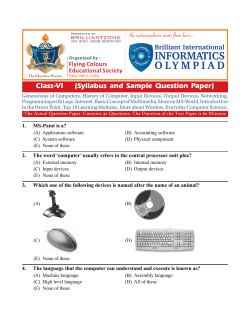
leaflet - Translink Project
TransLink Factsheet Partners Partner Country Italy Project full Title: Lead Scientist Emanuele (AOP) Cozzi France Sophie Brouard (INSERM) France Jean-Christian Roussel (CHU) Spain Rafael Mañez Manuel Galiñanes (ICS) Spain Cristina Costa (IDIBELL) UK Yasuhiro Takeuchi (UCL) TransLink, Defining the role of xeno-directed and autoimmune events in patients receiving animal-derived bioprosthetic heart valves is an FP7 Collaborative Project. Topics addressed: HEALTH.2013.1.3-2: Innovative approaches to address adverse immune reactions to biomedical devices, implants and transplant tissues Project coordinator: Dr. Emanuele Cozzi, MD, PhD Azienda Ospedaliera Padova Italy Azienda Ospedaliera Padova info@translinkproject.com Project Duration: 1st September 2013- 31st August 2017 Israel Sweden Italy Spain Italy Vered Padler-Karavani (TAU) Michael Breimer (UGOT) Cesare (AVT) USA Gino Gerosa (UNIPD) Nonell-Canals (MtB) Xi (UCAL) € 7,949,030 EU funding: € 5,996,971 Marta Pascual Gilabert (IUCT) Alfons Spain Galli Project Budget: Chen Partners: 6 academic research organisations (INSERM, IDIBELL, UCL, TAU, UGOT, UCal) 4 hospitals and/or (AOP, CHU, ICS and UNIPD) 3 small and (AVT, IUCT and MtB) clinical practitioners medium enterprises Project financed by the European Union Seventh Framework Programme (FP7/2007–2013) under Grant Agreement no. 603049. © TRANSLINK PROJECT | PADOVA - ITALY 2014 | ALL RIGHTS RESERVED About TransLink TransLink WorkPlan Each year, approximately 400,000 patients worldwide require heart valve replacement after a failure of their own valve. In this context, Bioprosthetic Heart Valves (BHV) represent the best treatment option. However, the use of BHV is exclusively restricted to elderly patients as, in young subjects, these undergo premature failure. Scientific Advisory Board WP2 WP1 Clinical data, biomanking and statistical analysis Partners involved: AOP, CHU, ICS, UNIPD Concept and Objectives WP7 Management Partners involved: AOP, IUCT TransLink proposes a prospective clinical and biological observational study of an international multicentre cohort of patients (over 3,000 BHV recipients and matched controls) recruited in four large EU centres of cardiac surgery. TransLink’s objectives are the following: To characterize the nature and the magnitude of humoral anti-BHV immune response and determine the coparticipation of the natural cellular immune response following BHV implantation. To correlate the magnitude and quality of the anti-BHV immune response with BHV function and clinical outcome. To explore the potential side effects on the BHV recipients themselves (susceptibility to bacterial infection, vascular inflammation) To enable the development of novel preventive and therapeutic strategies to combat BHV-related adverse immune reactions. WP2 will undertake, co-ordinate and centralise: a) the in-vitro assessments to identify the carbohydrate moieties on porcine/bovine BHV potentially exposed to anti-BHV immune responses; b) the study of the humoral immune response of the patients recruited by WP1. State of the art tests for biochemical characterization of engineered BHV and mesurements of the anti-BHV humoral immune response Partners involved: AOP, ICS, TAU, UGOT, UCal WP3 will explore the immune mechanisms responsible for BHV deterioration as well as possible undesirable effects in BHV recipients (vascular inflammation). WP3 Mechanisms of BHV impiants damage and possible recipient disease mediated by the anti-BHV immune response Partners involved: INSERM, ICS, IDIBELL, UGOT WP5 Remedies: prevention and treatment Partners involved: ICS, AVT, IUCT, MtB WP4 Potential intectous ask relatd to the anti-BHV immune response Partners involved: ICS, UCL Clinical and Ethical Board WP4 will shed light on the mechanisms that may increase susceptibility to infection in BHV recipients. WP6 Dissemination and training (Led by IUCT) The success of TransLink will be highly dependent on the synergistic and integrative collaboration between highly specialised professionals working in the context of 7 well defined Work Packages (WP). WP1 will be responsible for the smooth running of the clinical study. In particular, it will make sure that TransLink enrols in the 4 centres the cohort of approximately 2,600 BHV recipients necessary for the study. Thanks to 3 partner SMEs with cutting-edge technology, in WP5 TransLink will embark on a “remedy-programme” that will, either pre-emptively (by generating suitable KO-animals) or therapeutically (by using specially designed polymers), protect BHVs and possibly BHV recipients from BHV-derived side-effects detrimental to health. Finally, WP6 will be devoted to Training and Dissemination and will be in charge of disseminating the knowledge acquired with TransLink, whilst WP7 will be devoted to Management.
© Copyright 2025










